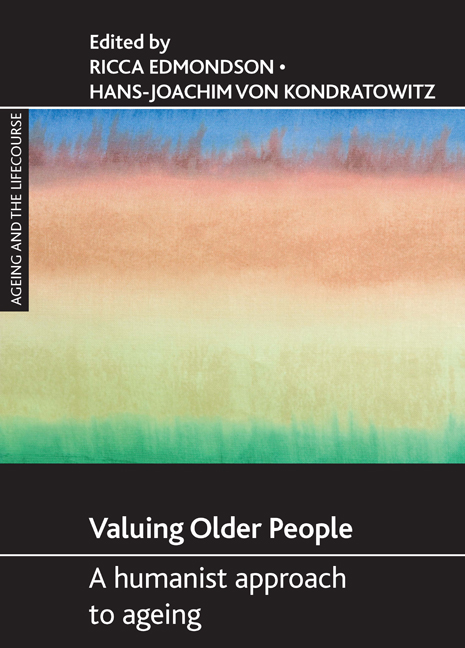Book contents
- Frontmatter
- Contents
- List of tables and figures
- Notes on contributors
- Acknowledgements
- Foreword
- Introduction
- Part One Religion, spirituality, cultural resources and creating meaning
- Part Two Norms, values and gerontology
- Part Three Ageing and wisdom? Conflicts and contested developments
- Afterwords
- Index
- Available titles in the Ageing and the Lifecourse series
fourteen - Does eldership mean anything in the contemporary West?
Published online by Cambridge University Press: 05 July 2022
- Frontmatter
- Contents
- List of tables and figures
- Notes on contributors
- Acknowledgements
- Foreword
- Introduction
- Part One Religion, spirituality, cultural resources and creating meaning
- Part Two Norms, values and gerontology
- Part Three Ageing and wisdom? Conflicts and contested developments
- Afterwords
- Index
- Available titles in the Ageing and the Lifecourse series
Summary
This chapter explores the idea of ‘eldership’ in contrasting cultural contexts. It begins with accounts of traditional eldership as practised in Guatemala, New Zealand and Samoa, going on to compare them with understandings within European populations in New Zealand and Great Britain. In the first group of settings, we can witness the continuing strengths of eldership as a formal public and family role within indigenous communities, as well as a willingness to value a more individualised understanding of eldership within sections of the European community in New Zealand. Consideration of the British experience introduces a participative inquiry involving people born between 1940 and 1956 with a declared belief in ‘creative’ ageing (Nichol, 2007). People who took part in this study rejected eldership as an identification, while affirming a belief in later-life development and contribution. This they explored under the thematic headings of ‘slowing down to find it’, ‘purple’ eldership and ‘guardianship’. The process of carrying out the inquiry uncovered doubts and uncertainties about the recognition of older people; but it also led the participants to affirm a conception of ‘mature’ peership and of mature peer groups as potential spaces for mutual recognition, reflection and a sense of shared experience.
Eldership in Guatemala
A Guatemalan story illustrates the traditional role of elders. The Goddess of Water has been dismembered and her heart captured by the Lords and Ladies of Death. Her (non-divine) partner collects her bones together and descends into the infernal realm to recover her heart. He succeeds at a price, returning to the earth's surface with only a toe bone and a tooth to go with the recovered heart of the Goddess, himself so badly wounded that he dies.
Four elders – Grandmother Growth, the Father of the Mountain, the Old Woman and the Old Man – now intervene. Covering the body of the man and the toe bone, tooth and heart of the Goddess with a blanket, they sing their wisdom. ‘The world wept and whimpered in the ground while the two gods and two old humans sang the ancient life-giving songs’ (Pretchel, 2002: 99) After the old ones have nearly exhausted their repertoire of 200 songs, the blanket is lifted. Man and Goddess (now a mortal woman) have revived and are whole. The elders comment, ‘It's the same every year’ (Pretchel, 2002: 99).
- Type
- Chapter
- Information
- Valuing Older PeopleA Humanist Approach to Ageing, pp. 249 - 260Publisher: Bristol University PressPrint publication year: 2009

